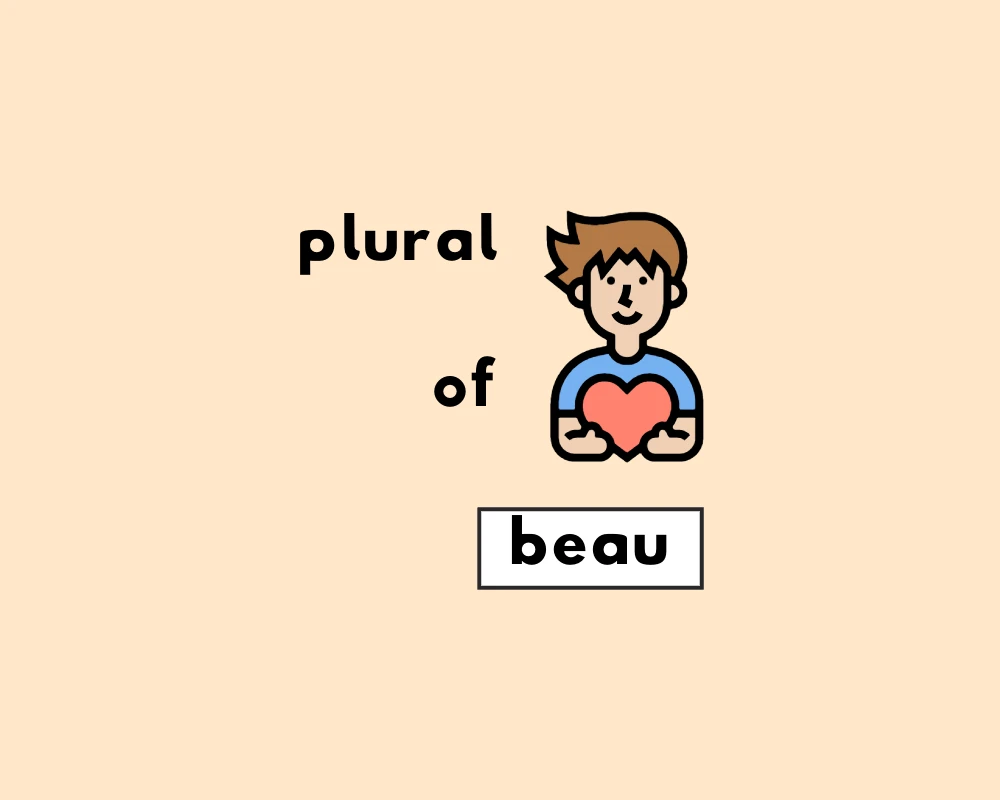What’s the plural of “beau”?
The plural of beau is beaux or beaus. Beau is originally a French word, and the plural beaux is the original French plural form. Beaux is irregular in English, as it doesn’t end in –s/-es. Beaus is a regular plural noun form, and has come to be accepted as a plural noun form of beau.
She was often seen around town with her various beaux.
All her previous beaus seemed to work in finance.
The museum acquired three antique bureauxs for the collection.
He introduced me to his three beau from college.
What’s the singular of beau?
Beau is singular.
What does the word “beau” mean?
A beau is understood in English as a “male sweetheart, boyfriend or lover” or “a frequent and attentive male escort for a girl or woman.”
Other French words in English
| singular | plural |
|---|---|
| bureau | bureaux or bureaus |
| château | châteaux or chateaus |
| beau | beaux or beaus |
| tableau | tableaux or tableaus |
Beau’s plurals are beaux (remember French ‘x’) and beaus (like regular English ‘s’).
Examples of the word beau used in sentences
The following sentences show the correct use of the word beau in context:
1. Your new beau speaks three languages.
2. That proved to be true for star chef, Cutthroat Kitchen champion and Just Savor founder Chef Huda, and her beau, IT exec and former winery owner Lamar.
3. Things seem to be going well until her new beau refuses to take her home.
4. As she juggles two jobs, moving in with her beau, and the continued draw of alcohol, Cassie seems to be spiraling out of control all over again.
5. Whatever the reason, Burton was committed enough to leave tiny Bunker Hill to seek out her beau.
Examples of beaus/beaux used in application
The following sentences show the correct use of the plural noun, beaus/beaux in sentences:
1. She’s been married twice and, in her own words, has had “lots of beaus.”
2. “And had you a great many smart beaux there? ”
3. In the front rank of the railway service I do not remember many beaux.
4. “Oh, they are talking of their favourite beaux, I dare say.”
5. Both the young girls were dressed in their best; for they were going to a quilting-party, where they expected to meet many beaux.
Origin of the word beau
According to Etymology Online, the word beau (n.) comes from:
Attendant suitor of a lady,” 1720, from French beau “the beautiful,” noun use of an adjective, from Old French bel “beautiful, handsome, fair, genuine, real” (11c.), from Latin bellus “handsome, fine, pretty, agreeable” (see belle).
Read more about nouns
| Types of nouns | What’s the plural of …? |
|---|---|
| plural-only nouns | …moose? |
| mass nouns | …octopus? |
| collective nouns | …cactus? |
| abstract nouns vs. concrete nouns | …analysis? |
| possessive nouns | …curriculum? |
| regular and irregular nouns | …crisis? |
Sources
Work Sheet
According to the post, what are the accepted plural forms of “beau”?
Which plural form of “beau” is identified in the post as the original French plural?
Which plural form of “beau” is identified in the post as a regular English plural form?
What does the singular word “beau” mean in English, according to the post?
Based on the post, which plural form is irregular in English because it does not end in -s or -es?
She was often seen around town with her various .
All her previous seemed to work in finance.
The singular form of “beau” is .
Both the young girls expected to meet many at the party.
The museum acquired three antique for the collection (referencing a similar French word from the post).
Frequently Asked Questions
What are the plurals for beau?
+
Are both plurals for beau correct?
+
Why does beau have two plurals?
+
What does the word beau mean?
+
What is an incorrect beau plural?
+
Yash, D. "What’s the Plural of Beau? Beaus or Beaux?." Grammarflex, Jun 18, 2025, https://www.grammarflex.com/whats-the-plural-of-beau/.











